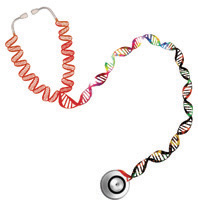

Digestive Diseases News
Fall 2008
Scientists Identify 21 New Genetic Loci Related to Crohn’s Disease
Findings Bring Researchers Closer to Novel Treatments
 A consortium of researchers from the United States, Canada, and Europe has identified 21 new genetic loci for Crohn’s disease, a chronic disease of the large and small intestines. This discovery, funded in part by the National Institute of Diabetes and Digestive and Kidney Diseases (NIDDK) at the National Institutes of Health (NIH), brings the total number of known genetic loci associated with Crohn’s disease to more than 30 and advances understanding of causes and potential avenues to develop new treatments. A consortium of researchers from the United States, Canada, and Europe has identified 21 new genetic loci for Crohn’s disease, a chronic disease of the large and small intestines. This discovery, funded in part by the National Institute of Diabetes and Digestive and Kidney Diseases (NIDDK) at the National Institutes of Health (NIH), brings the total number of known genetic loci associated with Crohn’s disease to more than 30 and advances understanding of causes and potential avenues to develop new treatments.
Additional research funding was provided by British, Belgian, and French government agencies and private foundations. Results were reported in the August edition of Nature Genetics.
Researchers from the NIDDK Inflammatory Bowel Disease (IBD) Consortium, the Wellcome Trust Case Control Consortium, and the Belgian-French IBD Genetics Consortium combined and analyzed samples from three studies that included 3,230 people with Crohn’s disease and 4,829 people without the condition. Study participants were all of European descent.
The large sample size helped researchers implicate new genetic loci in Crohn’s disease whose contributions to the disease were undetectable by previous small studies. These findings enable earlier predictions of which patients are at risk for the most serious forms of the disease, thereby permitting earlier treatment to prevent complications.
Several of the recently identified genetic loci, which were discovered through genome-wide scans, are located in genes involved in biochemical pathways promoting inflammation. Others are located in regions of the genome whose functions are unclear. Although the biochemical functions of these variants and how they trigger inflammation in the intestines require further study, they all represent potential targets for the development of new medications.
To confirm the findings, the researchers repeated the study in 3,664 additional people with Crohn’s disease, unaffected family members, and unaffected individuals from the general population.
“The discovery of 21 new loci for Crohn’s disease highlights the importance of large genome-wide studies in determining genes responsible for some of the most common, intractable diseases that plague millions worldwide,” said Stephen P. James, M.D., director of the Division of Digestive Diseases and Nutrition at the NIDDK.
“The NIH will continue to support this and other genetic studies, and we are excited by the prospect of what the next series of studies may uncover.”
Crohn’s disease is a chronic form of IBD that usually affects the lower part of the small intestine or the large intestine, also known as the colon. The most common symptoms of Crohn’s disease are stomach pain and diarrhea. The disease tends to run in families and is more often diagnosed in people between the ages of 20 and 30. People of Jewish heritage, particularly Ashkenazi Jews, have an increased risk of developing Crohn’s disease.
The NIDDK has a fact sheet and an easy-to-read booklet about Crohn’s disease at www.digestive.niddk.nih.gov/ddiseases/pubs/crohns and www.digestive.niddk.nih.gov/ddiseases/pubs/crohns_ez, respectively.
[Top]
NIH Publication No. 09–4552
December 2008
|




